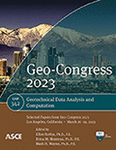Effect of Machine Learning Algorithms on Detection of Landslides Caused by the 2015 Lefkada Earthquake
Publication: Geo-Congress 2023
ABSTRACT
Machine learning algorithms can be used to detect landslides and develop landslide inventories following natural disasters. This study aims to evaluate the performance of different machine learning algorithms, specifically supervised methods, in detecting landslides on a complete high-quality landslide inventory. The Mw6.5 Lefkada earthquake that occurred on November 17, 2015, causing more than 700 landslides, was selected as the case study. The classification model used Worldview satellite imagery and digital elevation models (DEM) as input. Three machine learning algorithms were considered: random forest (RF), support vectors machine (SVM), and maximum likelihood (ML). All three machine learning algorithms classify landslides generally successfully, and RF achieves the best performance. Amalgamation is a typical issue in landslide detection and mapping, where multiple adjacent landslides are classified and mapped as one. This paper used flow direction to separate amalgamated landslides in the detection result. The result shows that the RF classifier captures large landslides more accurately than small landslides. Satellite imagery with higher resolution results in better classification performance than coarse-resolution imagery.
Get full access to this article
View all available purchase options and get full access to this chapter.
REFERENCES
Ahmad, A., and Quegan, S. (2012). Analysis of maximum likelihood classification on multispectral data. Applied Mathematical Sciences, 6(129), 6425–6436.
Breiman, L. (2001). Random forests. Machine learning, 45(1), 5–32.
Chen, W., Xie, X., Wang, J., Pradhan, B., Hong, H., Bui, D. T., and Ma, J. (2017). A comparative study of logistic model tree, random forest, and classification and regression tree models for spatial prediction of landslide susceptibility. Catena, 151, 147–160.
Chicco, D., and Jurman, G. (2020). The advantages of the Matthews correlation coefficient (MCC) over F1 score and accuracy in binary classification evaluation. BMC genomics, 21(1), 1–13.
Dai, F. C., Lee, C. F., and Ngai, Y. Y. (2002). Landslide risk assessment and management: an overview. Engineering geology, 64(1), 65–87.
Fell, R., Corominas, J., Bonnard, C., Cascini, L., Leroi, E., and Savage, W. Z. (2008). Guidelines for landslide susceptibility, hazard and risk zoning for land-use planning. Engineering geology, 102(3-4), 99–111.
Ghorbanzadeh, O., Blaschke, T., Gholamnia, K., Meena, S. R., Tiede, D., and Aryal, J. (2019). Evaluation of different machine learning methods and deep-learning convolutional neural networks for landslide detection. Remote Sensing, 11(2), 196.
Huang, Y., and Zhao, L. (2018). Review on landslide susceptibility mapping using support vector machines. Catena, 165, 520–529.
Jurman, G., Riccadonna, S., and Furlanello, C. (2012). A comparison of MCC and CEN error measures in multi-class prediction.
Li, X., Cheng, X., Chen, W., Chen, G., and Liu, S. (2015). Identification of forested landslides using LiDar data, object-based image analysis, and machine learning algorithms. Remote sensing, 7(8), 9705–9726.
Martha, T. R., Kerle, N., Jetten, V., van Westen, C. J., and Kumar, K. V. (2010). Characterising spectral, spatial and morphometric properties of landslides for semi-automatic detection using object-oriented methods. Geomorphology, 116(1-2), 24–36.
Mohan, A., Singh, A. K., Kumar, B., and Dwivedi, R. (2021). Review on remote sensing methods for landslide detection using machine and deep learning. Transactions on Emerging Telecommunications Technologies, 32(7), e3998.
Tavakkoli Piralilou, S., Shahabi, H., Jarihani, B., Ghorbanzadeh, O., Blaschke, T., Gholamnia, K., and Aryal, J. (2019). Landslide detection using multi-scale image segmentation and different machine learning models in the higher himalayas. Remote Sensing, 11(21), 2575.
Vapnik, V. (1999). The nature of statistical learning theory. Springer science & business media.
Wang, H., Zhang, L., Yin, K., Luo, H., and Li, J. (2021). Landslide identification using machine learning. Geoscience Frontiers, 12(1), 351–364.
Youssef, A. M., Pourghasemi, H. R., Pourtaghi, Z. S., and Al-Katheeri, M. M. (2016). Landslide susceptibility mapping using random forest, boosted regression tree, classification and regression tree, and general linear models and comparison of their performance at Wadi Tayyah Basin, Asir Region, Saudi Arabia. Landslides, 13(5), 839–856.
Zekkos, D., Manousakis, J., Greenwood, W., and Lynch, J. (2016). Immediate UAV-enabled infrastructure reconnaissance following recent natural disasters: Case histories from Greece. In International conference on natural hazards and infrastructure (pp. 28–30).
Zekkos, D., Clark, M., Gong, W., Manousakis, J., and Greenwood, W. (2019). Landslides Driven by Extreme Events: Can We Learn More from More of Them?. GeoStrata Magazine Archive, 23(3), 44–51.
Zekkos, D., and Clark, M. (2020). Characterization of landslides and rock mass strength leveraging the 2015 Mw 6.5 Lefkada Earthquake in Greece (No. G17AP00088). US Geology Survey. National Earthquake Hazards Reduction Program, Award.
Zhao, C., and Lu, Z. (2018). Remote sensing of landslides—A review. Remote Sensing, 10(2), 279.
Information & Authors
Information
Published In
History
Published online: Mar 23, 2023
Authors
Metrics & Citations
Metrics
Citations
Download citation
If you have the appropriate software installed, you can download article citation data to the citation manager of your choice. Simply select your manager software from the list below and click Download.
Cited by
- Jhih-Rou Huang, Dimitrios Zekkos, Marin Clark, Co-Seismic Landslide Mobility Assessment Using Machine Learning Models, Geo-Congress 2024, 10.1061/9780784485347.048, (475-484), (2024).
